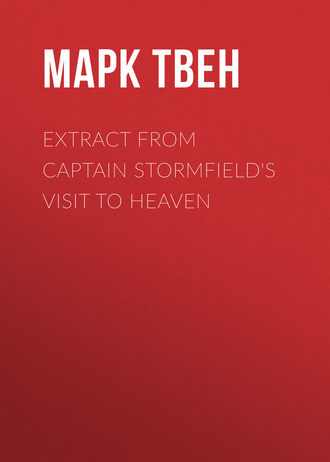
Марк Твен
Extract from Captain Stormfield's Visit to Heaven
“Well,” says I, “I’ve tucked mine away in the cupboard, and I allow to let them lay there till there’s mud.”
“Yes – or a reception.”
“What’s that?”
“Well, you can see one to-night if you want to. There’s a barkeeper from Jersey City going to be received.”
“Go on – tell me about it.”
“This barkeeper got converted at a Moody and Sankey meeting, in New York, and started home on the ferry-boat, and there was a collision and he got drowned. He is of a class that think all heaven goes wild with joy when a particularly hard lot like him is saved; they think all heaven turns out hosannahing to welcome them; they think there isn’t anything talked about in the realms of the blest but their case, for that day. This barkeeper thinks there hasn’t been such another stir here in years, as his coming is going to raise. – And I’ve always noticed this peculiarity about a dead barkeeper – he not only expects all hands to turn out when he arrives, but he expects to be received with a torchlight procession.”
“I reckon he is disappointed, then.”
“No, he isn’t. No man is allowed to be disappointed here. Whatever he wants, when he comes – that is, any reasonable and unsacrilegious thing – he can have. There’s always a few millions or billions of young folks around who don’t want any better entertainment than to fill up their lungs and swarm out with their torches and have a high time over a barkeeper. It tickles the barkeeper till he can’t rest, it makes a charming lark for the young folks, it don’t do anybody any harm, it don’t cost a rap, and it keeps up the place’s reputation for making all comers happy and content.”
“Very good. I’ll be on hand and see them land the barkeeper.”
“It is manners to go in full dress. You want to wear your wings, you know, and your other things.”
“Which ones?”
“Halo, and harp, and palm branch, and all that.”
“Well,” says I, “I reckon I ought to be ashamed of myself, but the fact is I left them laying around that day I resigned from the choir. I haven’t got a rag to wear but this robe and the wings.”
“That’s all right. You’ll find they’ve been raked up and saved for you. Send for them.”
“I’ll do it, Sandy. But what was it you was saying about unsacrilegious things, which people expect to get, and will be disappointed about?”
“Oh, there are a lot of such things that people expect and don’t get. For instance, there’s a Brooklyn preacher by the name of Talmage, who is laying up a considerable disappointment for himself. He says, every now and then in his sermons, that the first thing he does when he gets to heaven, will be to fling his arms around Abraham, Isaac and Jacob, and kiss them and weep on them. There’s millions of people down there on earth that are promising themselves the same thing. As many as sixty thousand people arrive here every single day, that want to run straight to Abraham, Isaac and Jacob, and hug them and weep on them. Now mind you, sixty thousand a day is a pretty heavy contract for those old people. If they were a mind to allow it, they wouldn’t ever have anything to do, year in and year out, but stand up and be hugged and wept on thirty-two hours in the twenty-four. They would be tired out and as wet as muskrats all the time. What would heaven be, to them? It would be a mighty good place to get out of – you know that, yourself. Those are kind and gentle old Jews, but they ain’t any fonder of kissing the emotional highlights of Brooklyn than you be. You mark my words, Mr. T.’s endearments are going to be declined, with thanks. There are limits to the privileges of the elect, even in heaven. Why, if Adam was to show himself to every new comer that wants to call and gaze at him and strike him for his autograph, he would never have time to do anything else but just that. Talmage has said he is going to give Adam some of his attentions, as well as A., I. and J. But he will have to change his mind about that.”
“Do you think Talmage will really come here?”
“Why, certainly, he will; but don’t you be alarmed; he will run with his own kind, and there’s plenty of them. That is the main charm of heaven – there’s all kinds here – which wouldn’t be the case if you let the preachers tell it. Anybody can find the sort he prefers, here, and he just lets the others alone, and they let him alone. When the Deity builds a heaven, it is built right, and on a liberal plan.”
Sandy sent home for his things, and I sent for mine, and about nine in the evening we begun to dress. Sandy says, —
“This is going to be a grand time for you, Stormy. Like as not some of the patriarchs will turn out.”
“No, but will they?”
“Like as not. Of course they are pretty exclusive. They hardly ever show themselves to the common public. I believe they never turn out except for an eleventh-hour convert. They wouldn’t do it then, only earthly tradition makes a grand show pretty necessary on that kind of an occasion.”
“Do they an turn out, Sandy?”
“Who? – all the patriarchs? Oh, no – hardly ever more than a couple. You will be here fifty thousand years – maybe more – before you get a glimpse of all the patriarchs and prophets. Since I have been here, Job has been to the front once, and once Ham and Jeremiah both at the same time. But the finest thing that has happened in my day was a year or so ago; that was Charles Peace’s reception – him they called ‘the Bannercross Murderer’ – an Englishman. There were four patriarchs and two prophets on the Grand Stand that time – there hasn’t been anything like it since Captain Kidd came; Abel was there – the first time in twelve hundred years. A report got around that Adam was coming; well, of course, Abel was enough to bring a crowd, all by himself, but there is nobody that can draw like Adam. It was a false report, but it got around, anyway, as I say, and it will be a long day before I see the like of it again. The reception was in the English department, of course, which is eight hundred and eleven million miles from the New Jersey line. I went, along with a good many of my neighbors, and it was a sight to see, I can tell you. Flocks came from all the departments. I saw Esquimaux there, and Tartars, Negroes, Chinamen – people from everywhere. You see a mixture like that in the Grand Choir, the first day you land here, but you hardly ever see it again. There were billions of people; when they were singing or hosannahing, the noise was wonderful; and even when their tongues were still the drumming of the wings was nearly enough to burst your head, for all the sky was as thick as if it was snowing angels. Although Adam was not there, it was a great time anyway, because we had three archangels on the Grand Stand – it is a seldom thing that even one comes out.”
“What did they look like, Sandy?”
“Well, they had shining faces, and shining robes, and wonderful rainbow wings, and they stood eighteen feet high, and wore swords, and held their heads up in a noble way, and looked like soldiers.”
“Did they have halos?”
“No – anyway, not the hoop kind. The archangels and the upper-class patriarchs wear a finer thing than that. It is a round, solid, splendid glory of gold, that is blinding to look at. You have often seen a patriarch in a picture, on earth, with that thing on – you remember it? – he looks as if he had his head in a brass platter. That don’t give you the right idea of it at all – it is much more shining and beautiful.”
“Did you talk with those archangels and patriarchs, Sandy?”
“Who —I? Why, what can you be thinking about, Stormy? I ain’t worthy to speak to such as they.”
“Is Talmage?”
“Of course not. You have got the same mixed-up idea about these things that everybody has down there. I had it once, but I got over it. Down there they talk of the heavenly King – and that is right – but then they go right on speaking as if this was a republic and everybody was on a dead level with everybody else, and privileged to fling his arms around anybody he comes across, and be hail-fellow-well-met with all the elect, from the highest down. How tangled up and absurd that is! How are you going to have a republic under a king? How are you going to have a republic at all, where the head of the government is absolute, holds his place forever, and has no parliament, no council to meddle or make in his affairs, nobody voted for, nobody elected, nobody in the whole universe with a voice in the government, nobody asked to take a hand in its matters, and nobody allowed to do it? Fine republic, ain’t it?”
“Well, yes – it is a little different from the idea I had – but I thought I might go around and get acquainted with the grandees, anyway – not exactly splice the main-brace with them, you know, but shake hands and pass the time of day.”
“Could Tom, Dick and Harry call on the Cabinet of Russia and do that? – on Prince Gortschakoff, for instance?”
“I reckon not, Sandy.”
“Well, this is Russia – only more so. There’s not the shadow of a republic about it anywhere. There are ranks, here. There are viceroys, princes, governors, sub-governors, sub-sub-governors, and a hundred orders of nobility, grading along down from grand-ducal archangels, stage by stage, till the general level is struck, where there ain’t any titles. Do you know what a prince of the blood is, on earth?”
“No.”
“Well, a prince of the blood don’t belong to the royal family exactly, and he don’t belong to the mere nobility of the kingdom; he is lower than the one, and higher than t’other. That’s about the position of the patriarchs and prophets here. There’s some mighty high nobility here – people that you and I ain’t worthy to polish sandals for – and they ain’t worthy to polish sandals for the patriarchs and prophets. That gives you a kind of an idea of their rank, don’t it? You begin to see how high up they are, don’t you? just to get a two-minute glimpse of one of them is a thing for a body to remember and tell about for a thousand years. Why, Captain, just think of this: if Abraham was to set his foot down here by this door, there would be a railing set up around that foot-track right away, and a shelter put over it, and people would flock here from all over heaven, for hundreds and hundreds of years, to look at it. Abraham is one of the parties that Mr. Talmage, of Brooklyn, is going to embrace, and kiss, and weep on, when he comes. He wants to lay in a good stock of tears, you know, or five to one he will go dry before he gets a chance to do it.”
“Sandy,” says I, “I had an idea that I was going to be equals with everybody here, too, but I will let that drop. It don’t matter, and I am plenty happy enough anyway.”
“Captain, you are happier than you would be, the other way. These old patriarchs and prophets have got ages the start of you; they know more in two minutes than you know in a year. Did you ever try to have a sociable improving-time discussing winds, and currents and variations of compass with an undertaker?”
“I get your idea, Sandy. He couldn’t interest me. He would be an ignoramus in such things – he would bore me, and I would bore him.”
“You have got it. You would bore the patriarchs when you talked, and when they talked they would shoot over your head. By and by you would say, ‘Good morning, your Eminence, I will call again’ – but you wouldn’t. Did you ever ask the slush-boy to come up in the cabin and take dinner with you?”
“I get your drift again, Sandy. I wouldn’t be used to such grand people as the patriarchs and prophets, and I would be sheepish and tongue-tied in their company, and mighty glad to get out of it. Sandy, which is the highest rank, patriarch or prophet?”
“Oh, the prophets hold over the patriarchs. The newest prophet, even, is of a sight more consequence than the oldest patriarch. Yes, sir, Adam himself has to walk behind Shakespeare.”
“Was Shakespeare a prophet?”
“Of course he was; and so was Homer, and heaps more. But Shakespeare and the rest have to walk behind a common tailor from Tennessee, by the name of Billings; and behind a horse-doctor named Sakka, from Afghanistan. Jeremiah, and Billings and Buddha walk together, side by side, right behind a crowd from planets not in our astronomy; next come a dozen or two from Jupiter and other worlds; next come Daniel, and Sakka and Confucius; next a lot from systems outside of ours; next come Ezekiel, and Mahomet, Zoroaster, and a knife-grinder from ancient Egypt; then there is a long string, and after them, away down toward the bottom, come Shakespeare and Homer, and a shoemaker named Marais, from the back settlements of France.”
“Have they really rung in Mahomet and all those other heathens?”
“Yes – they all had their message, and they all get their reward. The man who don’t get his reward on earth, needn’t bother – he will get it here, sure.”
“But why did they throw off on Shakespeare, that way, and put him away down there below those shoe-makers and horse-doctors and knife-grinders – a lot of people nobody ever heard of?”
“That is the heavenly justice of it – they warn’t rewarded according to their deserts, on earth, but here they get their rightful rank. That tailor Billings, from Tennessee, wrote poetry that Homer and Shakespeare couldn’t begin to come up to; but nobody would print it, nobody read it but his neighbors, an ignorant lot, and they laughed at it. Whenever the village had a drunken frolic and a dance, they would drag him in and crown him with cabbage leaves, and pretend to bow down to him; and one night when he was sick and nearly starved to death, they had him out and crowned him, and then they rode him on a rail about the village, and everybody followed along, beating tin pans and yelling. Well, he died before morning. He wasn’t ever expecting to go to heaven, much less that there was going to be any fuss made over him, so I reckon he was a good deal surprised when the reception broke on him.”
“Was you there, Sandy?”
“Bless you, no!”
“Why? Didn’t you know it was going to come off?”
“Well, I judge I did. It was the talk of these realms – not for a day, like this barkeeper business, but for twenty years before the man died.”
“Why the mischief didn’t you go, then?”
“Now how you talk! The like of me go meddling around at the reception of a prophet? A mudsill like me trying to push in and help receive an awful grandee like Edward J. Billings? Why, I should have been laughed at for a billion miles around. I shouldn’t ever heard the last of it.”
“Well, who did go, then?”
“Mighty few people that you and I will ever get a chance to see, Captain. Not a solitary commoner ever has the luck to see a reception of a prophet, I can tell you. All the nobility, and all the patriarchs and prophets – every last one of them – and all the archangels, and all the princes and governors and viceroys, were there, – and no small fry – not a single one. And mind you, I’m not talking about only the grandees from our world, but the princes and patriarchs and so on from all the worlds that shine in our sky, and from billions more that belong in systems upon systems away outside of the one our sun is in. There were some prophets and patriarchs there that ours ain’t a circumstance to, for rank and illustriousness and all that. Some were from Jupiter and other worlds in our own system, but the most celebrated were three poets, Saa, Bo and Soof, from great planets in three different and very remote systems. These three names are common and familiar in every nook and corner of heaven, clear from one end of it to the other – fully as well known as the eighty Supreme Archangels, in fact – where as our Moses, and Adam, and the rest, have not been heard of outside of our world’s little corner of heaven, except by a few very learned men scattered here and there – and they always spell their names wrong, and get the performances of one mixed up with the doings of another, and they almost always locate them simply in our solar system, and think that is enough without going into little details such as naming the particular world they are from. It is like a learned Hindoo showing off how much he knows by saying Longfellow lives in the United States – as if he lived all over the United States, and as if the country was so small you couldn’t throw a brick there without hitting him. Between you and me, it does gravel me, the cool way people from those monster worlds outside our system snub our little world, and even our system. Of course we think a good deal of Jupiter, because our world is only a potato to it, for size; but then there are worlds in other systems that Jupiter isn’t even a mustard-seed to – like the planet Goobra, for instance, which you couldn’t squeeze inside the orbit of Halley’s comet without straining the rivets. Tourists from Goobra (I mean parties that lived and died there – natives) come here, now and then, and inquire about our world, and when they find out it is so little that a streak of lightning can flash clear around it in the eighth of a second, they have to lean up against something to laugh. Then they screw a glass into their eye and go to examining us, as if we were a curious kind of foreign bug, or something of that sort. One of them asked me how long our day was; and when I told him it was twelve hours long, as a general thing, he asked me if people where I was from considered it worth while to get up and wash for such a day as that. That is the way with those Goobra people – they can’t seem to let a chance go by to throw it in your face that their day is three hundred and twenty-two of our years long. This young snob was just of age – he was six or seven thousand of his days old – say two million of our years – and he had all the puppy airs that belong to that time of life – that turning-point when a person has got over being a boy and yet ain’t quite a man exactly. If it had been anywhere else but in heaven, I would have given him a piece of my mind. Well, anyway, Billings had the grandest reception that has been seen in thousands of centuries, and I think it will have a good effect. His name will be carried pretty far, and it will make our system talked about, and maybe our world, too, and raise us in the respect of the general public of heaven. Why, look here – Shakespeare walked backwards before that tailor from Tennessee, and scattered flowers for him to walk on, and Homer stood behind his chair and waited on him at the banquet. Of course that didn’t go for much there, amongst all those big foreigners from other systems, as they hadn’t heard of Shakespeare or Homer either, but it would amount to considerable down there on our little earth if they could know about it. I wish there was something in that miserable spiritualism, so we could send them word. That Tennessee village would set up a monument to Billings, then, and his autograph would outsell Satan’s. Well, they had grand times at that reception – a small-fry noble from Hoboken told me all about it – Sir Richard Duffer, Baronet.”






